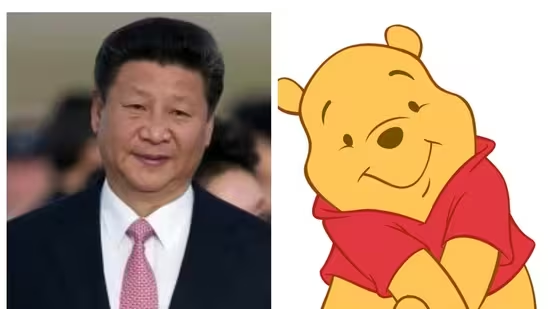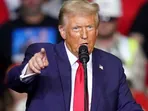Why Winnie-the-Pooh makes Xi Jinping uncomfortable
This article is part of our Summer reads series. Visit the full collection for book lists, guest essays and more seasonal distractions.  PREMIUM
PREMIUM
WINNIE-THE-POOH is a good-natured, credulous bear. That makes him an unlikely protagonist for a slasher movie. “Winnie the Pooh: Blood and Honey”, released earlier this year, has been panned by film-goers around the world. In Hong Kong it was pulled by cinemas before it opened. It did not even make it that far in mainland China. That is not because of the unconvincing amount of gore that is spilt, nor because the film’s whole premise is preposterous. Any depiction of Pooh is guaranteed to attract the attention of the Chinese authorities. Why?
When Xi Jinping visited Barack Obama at the White House in 2013, a social-media wag remarked on how the pair resembled Pooh and Tigger, the bear’s fictional buddy. America’s president was tall and lithe; China’s leader, in comparison, seemed squat and a little pot-bellied. Mr Obama’s wiry frame reaches 1.87 metres. Mr Xi’s height, though a matter of some mystery, is believed to be between 1.75 and 1.78 metres. Whatever the truth, a meme was born.
Censoring China’s internet is a game of whack-a-mole. Direct criticism of the Communist Party and its general secretary is quickly seized upon, so netizens must find inventive ways to grumble or mock before the authorities catch on to them. For a while, a harmless bear became that elusive mole. Arch online mentions of Pooh were known to be references to China’s leader. In 2015 a picture of Mr Xi poking through the sunroof of a limousine during a military parade was widely compared to one of Pooh sitting in a toy car. It became China’s most-censored image of the year, according to Global Risks Insights, an organisation that analyses political risk. By 2017 小熊维尼, the Chinese characters for Winnie-the-Pooh (literally “Little Bear Winnie”) had in effect been banned on China’s internet.
Given that the comparison to Mr Xi was often light-hearted, the reaction might seem like over-sensitivity. World leaders often try to cloak their authoritarianism with an endearing alter-ego, after all: Mr Xi himself once revelled in the moniker “Xi Dada”, fawningly used by state media, until some began mocking him for it. But China’s leader suffers from a more common trait still among authoritarians: a thin skin. Mr Xi has accumulated more power than any of his predecessors since Mao Zedong. Like Mao he has burnished a cult of personality, in which he must be viewed as infallible. He is obsessed with image. Party cadres are expected to learn the wisdom of Xi by rote. There is no room for ribbing, no matter how gentle.
And so China sends forth armies of censors and secret police to trawl online posts. Internet firms employ moderators in their tens of thousands to spot and delete banned ideas and images—including endearing ursine ones—within seconds. Censors’ sensitivity can verge on the ridiculous. Last year a man live-streamed himself eating a cake. Authorities fretted that the delicacy looked like a tank, so he was hauled off air for fear he was alluding to those that cleared student protesters from Tiananmen Square with murderous force in 1989. Last year the Cyberspace Administration of China enacted a rule that all comments on Chinese news sites be screened before they can be posted.
In 2000, Bill Clinton famously predicted that China’s authoritarian regime, determined to police what the people say about it, would prove impotent in an age of smartphones and freely circulating online information. In fact, Mr Xi’s government—a few rogue bears aside—has shown itself more than capable of maintaining control. As A.A. Milne (an acquaintance of Winnie-the-Pooh, as it happens) purportedly said: “Organisation is what you do before you do something so that when you do it, it’s not all mixed up.”
© 2023, The Economist Newspaper Limited. All rights reserved. From The Economist, published under licence. The original content can be found on www.economist.com
Enjoy unlimited digital access with HT Premium
Subscribe Now to continue reading Start 14 Days Free Trial Already Subscribed? Sign In
Disclaimer: The copyright of this article belongs to the original author. Reposting this article is solely for the purpose of information dissemination and does not constitute any investment advice. If there is any infringement, please contact us immediately. We will make corrections or deletions as necessary. Thank you.
Title:Why Winnie-the-Pooh makes Xi Jinping uncomfortable
Url:https://www.investsfocus.com







